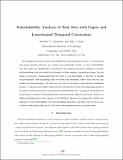Schedulability Analysis of Task Sets with Upper- and Lower-Bound Temporal Constraints
Author(s)
Shah, Julie A.; Gombolay, Matthew Craig
DownloadShah_Schedulability analysis.pdf (1.537Mb)
OPEN_ACCESS_POLICY
Open Access Policy
Creative Commons Attribution-Noncommercial-Share Alike
Terms of use
Metadata
Show full item recordAbstract
Increasingly, real-time systems must handle the self-suspension of tasks (that is, lower-bound wait times between subtasks) in a timely and predictable manner. A fast schedulability test that does not significantly overestimate the temporal resources needed to execute self-suspending task sets would be of benefit to these modern computing systems. In this paper, a polynomial-time test is presented that is known to be the first to handle nonpreemptive self-suspending task sets with hard deadlines, where each task has any number of self-suspensions. To construct the test, a novel priority scheduling policy is leveraged, the jth subtask first, which restricts the behavior of the self-suspending model to provide an analytical basis for an informative schedulability test. In general, the problem of sequencing according to both upper-bound and lower-bound temporal constraints requires an idling scheduling policy and is known to be nondeterministic polynomial-time hard. However, the tightness of the schedulability test and scheduling algorithm are empirically validated, and it is shown that the processor is able to effectively use up to 95% of the self-suspension time to execute tasks.
Date issued
2014-12Department
Massachusetts Institute of Technology. Department of Aeronautics and AstronauticsJournal
Journal of Aerospace Information Systems
Publisher
American Institute of Aeronautics and Astronautics
Citation
Gombolay, Matthew C., and Julie A. Shah. “Schedulability Analysis of Task Sets with Upper- and Lower-Bound Temporal Constraints.” Journal of Aerospace Information Systems 11, no. 12 (December 2014): 821–841.
Version: Author's final manuscript
ISSN
2327-3097